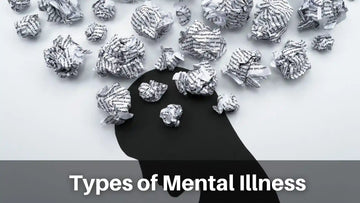In today’s fast-paced world, where everyone is juggling multiple responsibilities, maintaining mental health is just as important as physical health. Stress, anxiety, and burnout have become common concerns for people of all ages. Whether it's due to work pressure, personal issues, or the overall hustle of life, mental well-being is often neglected, which can lead to long-term health problems.
But mental health is not something that should be ignored or taken lightly. Just like you maintain your physical fitness, taking small but significant steps toward mental health is essential for achieving stability, happiness, and peace of mind. In this blog, we will share the top 10 practical tips that will help you maintain your mental health and lead a more balanced life.
Also Read: Mastering Mental Peace: The Ultimate Guide to Anxiety Exercises
What is Mental Health?
Mental health refers to your emotional, psychological, and social well-being. It affects how you think, feel, and behave in daily life. Good mental health helps individuals cope with stress, relate to others, and make decisions. It’s not just the absence of mental illness but a state of well-being where a person can realize their potential, handle the normal stresses of life, work productively, and contribute to their community.
Mental health can fluctuate based on external circumstances, internal emotional states, and how well one manages challenges. Factors like genetics, trauma, chronic stress, and personal choices can impact mental health. Just like physical health, mental health requires attention, care, and proactive measures to ensure long-term well-being.
How To Achieve Mind Stability
Mind stability, or mental balance, refers to the ability to stay calm and composed even in stressful situations. Achieving mind stability involves cultivating emotional resilience and practicing techniques that improve concentration, reduce anxiety, and promote emotional health.
Practices like mindfulness, meditation, and deep breathing exercises are incredibly helpful in calming the mind and reducing overthinking. Additionally, regular physical exercise, a healthy diet, and proper sleep also play an essential role in achieving mental stability. Reducing screen time, avoiding toxic environments, and setting boundaries with people who drain your energy are also crucial for maintaining balance. Remember, mind stability is a continuous journey, and small steps can create significant, positive changes in your life.
Also Read: The Different Types of Mental Illness: Symptoms, Causes, and Treatment Options
Mental Health Tips
1. Prioritize Self-Care
Self-care is essential for mental well-being. Make time for activities that relax and recharge you, like reading, listening to music, or taking a long bath. Practicing self-care consistently helps reduce stress and anxiety, ensuring you don’t burn out.
2. Practice Mindfulness
Mindfulness is all about being present in the moment. Instead of worrying about the future or dwelling on the past, focus on the present by practicing mindfulness through meditation or simply paying attention to your thoughts and surroundings. This practice can greatly reduce stress and improve emotional regulation.
3. Stay Physically Active
Physical activity doesn’t just improve your body—it also benefits your mind. Exercise releases endorphins, known as the "feel-good" hormones, which help combat stress, depression, and anxiety. Incorporate regular exercise into your routine, even if it’s a short walk or light yoga.
4. Maintain a Healthy Diet
What you eat affects not just your body, but your brain as well. A diet rich in fruits, vegetables, lean proteins, and whole grains can improve brain function, mood, and energy levels. Avoid excessive consumption of sugary or processed foods, as they can lead to mood swings and fatigue.
5. Get Enough Sleep
Sleep is crucial for mental health. Lack of proper sleep can lead to irritability, low mood, and increased stress levels. Aim for 7-9 hours of quality sleep each night to give your brain and body the rest they need to function well.
6. Build Strong Relationships
Social connections are vital for maintaining mental health. Surround yourself with positive, supportive friends and family. Strong relationships offer emotional support and provide a sense of belonging, which is important for well-being.
7. Set Realistic Goals
Setting and achieving goals gives you a sense of purpose and accomplishment. However, it’s important to set realistic, manageable goals to avoid unnecessary stress and disappointment. Break large tasks into smaller, more attainable steps.
8. Manage Stress
Learn to identify what triggers your stress and develop coping strategies, such as deep breathing, journaling, or taking time off. Managing stress helps in preventing it from accumulating and turning into chronic anxiety or burnout.
9. Limit Screen Time
Excessive screen time, especially on social media, can negatively affect mental health by increasing feelings of loneliness, inadequacy, and anxiety. Set boundaries for how much time you spend online, and engage in offline activities like reading or nature walks.
10. Seek Professional Help When Needed
Sometimes, self-care and lifestyle changes aren't enough to manage mental health. If you're feeling overwhelmed, anxious, or depressed for prolonged periods, don’t hesitate to seek professional help. Therapists and counselors can provide guidance and tools to help you manage difficult emotions and situations.
Also Read: Essential Mental Health Tips for a Balanced, Joyful Life: A Comprehensive Guide
Conclusion
Mental health is a cornerstone of overall well-being, yet it often gets overlooked in our busy lives. Incorporating small, consistent practices into your daily routine can have a profound effect on how you feel emotionally, mentally, and physically. From practicing mindfulness and staying active to building strong relationships and managing stress, there are multiple ways to ensure that your mental health remains stable and strong.
It's essential to remember that mental health is a journey, not a destination. It's okay to seek help, take breaks, and give yourself time to recover when needed. By following the tips mentioned above, you can create a balanced lifestyle that supports mental resilience, allowing you to navigate life's challenges with greater ease. Taking care of your mental health not only improves your own life but also positively impacts those around you, creating a healthier and more supportive environment for everyone.












